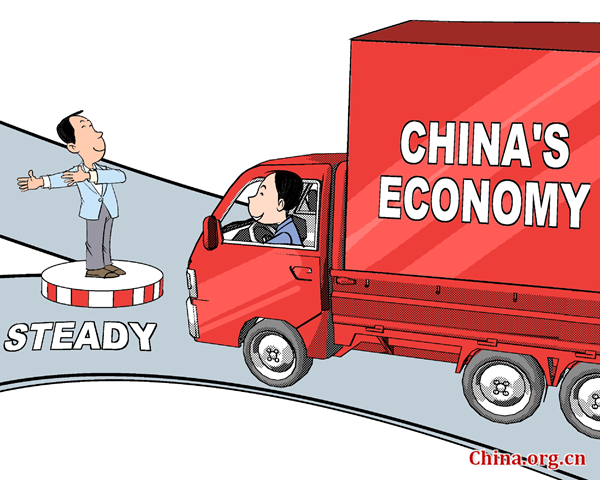Renew trade policy for 'new normal' economy
- By Zhang Lijuan
 0 Comment(s)
0 Comment(s) Print
Print E-mail China.org.cn, April 2, 2015
E-mail China.org.cn, April 2, 2015
|
|
|
The right way [By Jiao Haiyang/China.org.cn] |
For the last three decades, "openness" has been the key word for the Chinese economy. To a large extent, openness has meant the export of made-in-China products and the attraction of foreign direct investment. Consequently, China's trade policy has featured export and FDI-oriented policies that resulted in the emergence of made-in-China factories. In the mid-2000s, China's trade dependence ratio reached more than 60 percent, which meant much of China's economic growth relied on trade expansion.
Now, China is at the beginning of a "new normal" economy. From a trade policy perspective, "new normal" economic growth should rely less on trade expansion and more on domestic consumption, less on cheap "made in China" goods and more on "created in China" goods and services. Such a transition will require an overhaul of China's longstanding trade policy.
Traditional trade theory tells us that free trade is good for national wealth in general, but in the real world, free trade has always been under attack, even in developed economies such as the United States. The U.S. government has been pursuing "free but fair" trade policy for decades, while "fair" in many cases means trade protection in real practice. After thirty years of an "open door policy," China may also have to balance "free" and "fair" in its trade policymaking. As it looks toward the "new normal" economy, China needs to improve its trade policy accordingly.
First of all, China should strengthen domestic trade institutions to foster national competitiveness. There is little doubt about the huge impact of FDI on China's economic growth during the 1990s and 2000s. However, Yahoo's recent shutdown of its research and development operation in Beijing and Adobe's closure of its Chinese research and development center last year have created challenging implications for China's trade and competition policy.
According to the Goldman Sachs Global Investment Research report released in February 2015, U.S. investors rank the following factors as the most important considerations when investing in China: economic growth (95 percent), property rights protection (55 percent), rule of law (50 percent), political stability (47 percent), infrastructure (47 percent) and trade rules (42 percent). Labor costs and the availability of highly skilled workers play less important roles today than ever before.
Under the "new normal" economy, China's GDP growth is expected to be lower. Thus, China needs stronger trade institutions, which should include, but not be limited to, an effective trade policymaking regime, an intra-government coordinating system and transparent policy implementation mechanisms. China needs to improve its trade laws and regulations, particularly its antidumping and antitrust laws, so that foreign investors can understand and abide by them without institutional concerns.
Second, China should emphasize agricultural trade in line with food security and food safety considerations. Farm and food issues are strategic, economic and global issues. Agriculture plays a key role in every economy. No matter how advanced an economy is, it still has to make its agriculture sector a top priority in trade protection.
China has liberalized farm productivity since the late 1970s and has motivated millions of migrants to move to cities. Now Chinese farmers are experiencing the largest-scale urbanization in China's modern history. The challenges are obvious. Although China's agricultural production has increased dramatically in the past decades, the country remains a net importer of food and agricultural products.







Go to Forum >>0 Comment(s)